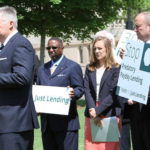No charges against unbuckled pope. Pope Benedict XVI can cross an outstanding charge of failing to wear a seatbelt from his list of worries. The southern German city of Freiburg threw out charges against the pontiff for riding in his popemobile without a seatbelt during a September visit. Although there is a requirement in Germany to wear seatbelts, even in slow-moving vehicles, city officials ruled the law didn't apply in the pope's case because the street on which he was spotted without a seatbelt had been closed for public traffic the day of his visit. Attorney Christian Sundermann had filed the complaint on behalf of an unnamed German resident of Dortmund. The plaintfiff argued the pope was seen several times during the visit—and captured in a YouTube video clip—riding in the popemobile without a seatbelt. Both the attorney and the plaintiff said this was not an attack on the Catholic Church, but rather an effort to raise awareness of the seatbelt law and increase enforcement.
Mormonism could present primary problem. If Republican presidential candidate Mitt Romney can secure his party's nomination, his Mormon faith shouldn't be an obstacle for voters in the general election, according to a survey from the Pew Research Center—but that may be a big "if." The Pew survey shows white evangelical Protestants—the heart of the GOP primary electorate—are most likely to know Romney is a Mormon and least likely to support him. The survey of 1,576 registered voters, conducted from Nov. 9-14, shows that while 54 percent of Republicans and those who lean Republican believe Mormons are Christian, just 35 percent of white evangelicals agree with that statement. Just 17 percent of white evangelicals say they back Romney in the primaries, as opposed to 23 percent of all GOP voters. Overall, views about Mormonism have remained stable since 2007, with about half of Americans saying they know something about Mormonism and the other half saying they don't know much about it.
Religious advocacy groups show growth. The number of religious advocacy groups in Washington, D.C., has more than tripled since the 1970s, according to a new report. Together, faith-based lobbying and advocacy groups spend $390 million a year to influence lawmakers, mobilize supporters and shape public opinion, according to a report by the Pew Forum on Religion & Public Life. Using financial reports from public tax forms, the biggest spender is the pro-Israel American Israel Public Affairs Committee, which spent $87 million on advocacy in 2008. U.S. Catholic bishops placed second, with $26.6 million spent in 2009, followed by the Family Research Council, with $14 million in 2008. Conservative groups have seen some of the largest budget increases. There now are as many Muslim advocacy groups as mainline Protestant groups, and evangelicals and Roman Catholics constitute a strong 40 percent of religious lobbyists in and around Washington. Allen Hertzke, a political scientist at the University of Oklahoma and the primary author of the report, noted the groups surveyed by Pew have grown from 67 in the 1970s to 212 now, but he conceded that figure probably is an undercount.
–Compiled from Religion News Service














We seek to connect God’s story and God’s people around the world. To learn more about God’s story, click here.
Send comments and feedback to Eric Black, our editor. For comments to be published, please specify “letter to the editor.” Maximum length for publication is 300 words.